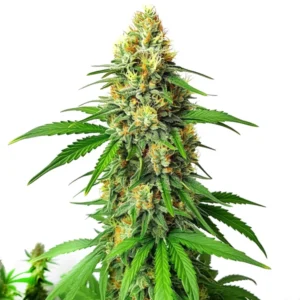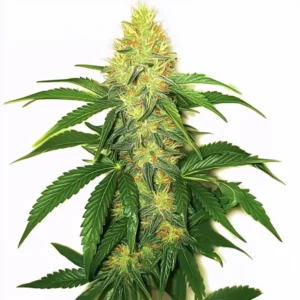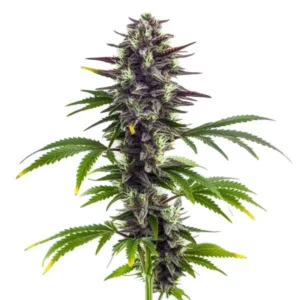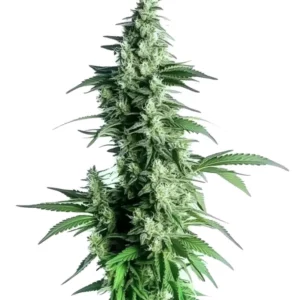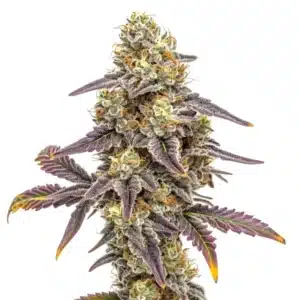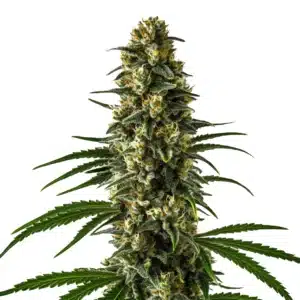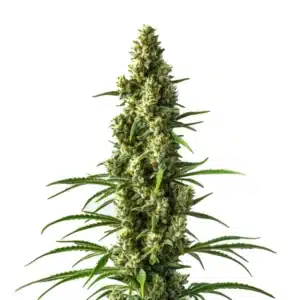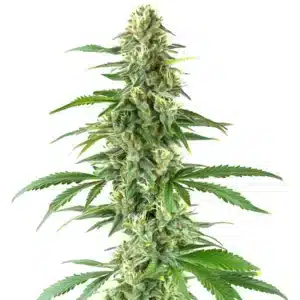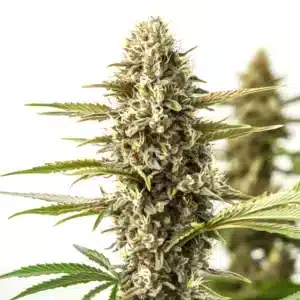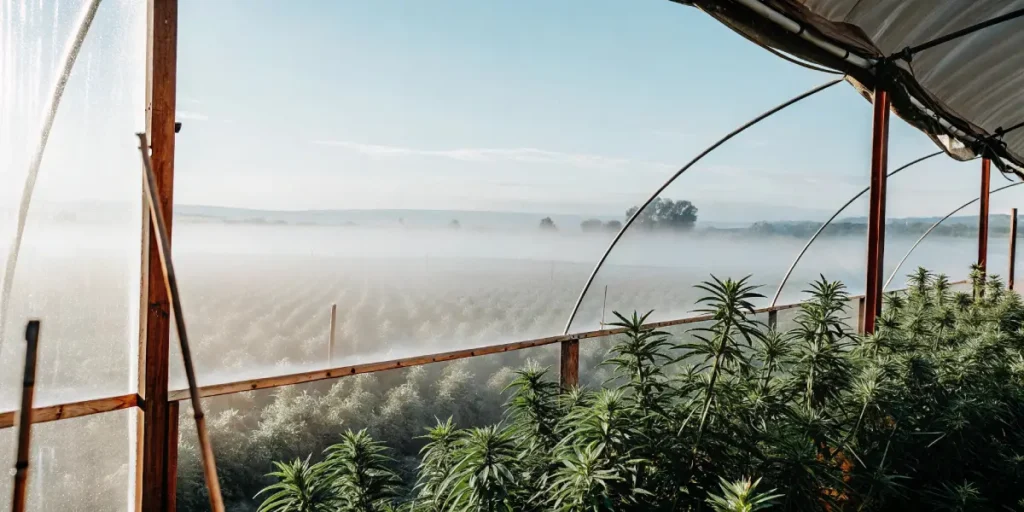
Natural Cannabinoid Synthesis
Natural cannabinoid synthesis is a fascinating process that takes place in the cannabis plant. As growers, knowing this can enhance the quality and potency of your crops. Cannabinoids are the chemical compounds responsible for the wide range of effects cannabis provides.
The synthesis of these cannabinoids occurs in the trichomes, the tiny, hair-like structures on the plant’s surface. These structures are most abundant on the flowers, making them the primary focus for those cultivating cannabis for medicinal or recreational use.
Recommended Strains
Critical x AK47 Auto
|
|
THC | 16% - 20% (Medium) |
|
|
Type | Autoflowering |
|
|
Yield | High |
|
|
Phenotype | 50% Indica / 50% Sativa |
AK 47
|
|
THC | 16% - 19% (Medium) |
|
|
Type | Feminized |
|
|
Yield | Medium |
|
|
Phenotype | 35% Indica / 65% Sativa |
To get the most out of your cannabis plants, it’s important to choose the right strains. At Blimburn Seeds, you can find strains like AK-47, known for its balanced effects, GG4, famous for its potent, relaxing properties, and Girl Scout Cookies, a favorite for its euphoric high.
Natural Cannabinoid Synthesis in Laboratory Settings
In recent years, the interest in replicating natural cannabinoid synthesis in laboratory settings has grown. This approach allows researchers to study cannabinoids in a controlled environment. By doing so, they can better understand the potential health benefits and applications.
Laboratory synthesis involves mimicking the natural processes that occur in cannabis plants. Scientists use various techniques to produce cannabinoids without growing the plant. This method can lead to new discoveries and advancements in natural cannabinoid synthesis techniques.
Natural cannabinoid synthesis in laboratory settings provides a unique opportunity to control every variable affecting cannabinoid production. This control allows scientists to explore the effects of different synthesis pathways and environmental conditions on cannabinoid yield and quality. By knowing these variables, researchers can optimize the synthesis process, potentially leading to more efficient production methods.
Furthermore, laboratory settings facilitate the exploration of new cannabinoids that may not be present in significant quantities in natural settings. These novel compounds could offer untapped therapeutic potential, expanding the possibilities for natural cannabinoid synthesis for therapeutic applications. Researchers can experiment with various catalysts and conditions, paving the way for innovative applications in medicine and beyond.
Advancements in Techniques
With technology advancing, scientists are now able to produce cannabinoids more efficiently. These advancements in natural cannabinoid synthesis techniques have opened up possibilities for new therapeutic applications. For growers, this means access to new strains that may offer unique benefits.
Researchers are experimenting with genetic modification and enzyme engineering to enhance cannabinoid production. These methods could lead to the creation of more potent strains, offering higher yields and better resistance to pests and diseases.
The ongoing advancements in natural cannabinoid synthesis techniques continue to revolutionize the industry. Innovations such as CRISPR gene editing and synthetic biology are enabling precise modifications that enhance cannabinoid profiles. These cutting-edge techniques offer the potential to generate strains with specific therapeutic properties, tailored to meet the needs of both medical professionals and patients.
Additionally, advancements in analytical technologies are allowing for more detailed profiling of cannabinoid content. This precision helps breeders and growers better understand the cannabinoid composition of their plants, enabling them to make informed decisions in their cultivation practices. As these technologies evolve, the future of cannabinoid synthesis looks promising, with increased efficiency and more targeted applications on the horizon.
Promos & Deals
Sustainable Natural Cannabinoid Synthesis Methods
Sustainability is a key concern for many in the cannabis industry. Sustainable natural cannabinoid synthesis methods focus on reducing environmental impact while maintaining high-quality production. This involves using fewer resources and minimizing waste.
Organic farming practices are a great example of sustainable methods. By utilizing natural fertilizers and pest control, growers can produce cannabis that is both eco-friendly and potent. Strains like GG4 are ideal for these methods due to their resilience and high yield.
Implementing sustainable natural cannabinoid synthesis methods also involves adopting renewable energy sources and water conservation techniques. Solar panels and rainwater harvesting systems can significantly reduce the carbon footprint of cannabis cultivation. These practices not only benefit the environment but can also lower operational costs in the long term.
Furthermore, sustainable methods encourage biodiversity by integrating companion planting and permaculture principles. These approaches create a harmonious ecosystem that supports healthy plant growth while discouraging pests naturally. By fostering such environments, growers can achieve a balance between high-quality production and ecological responsibility, ensuring the longevity of their operations.
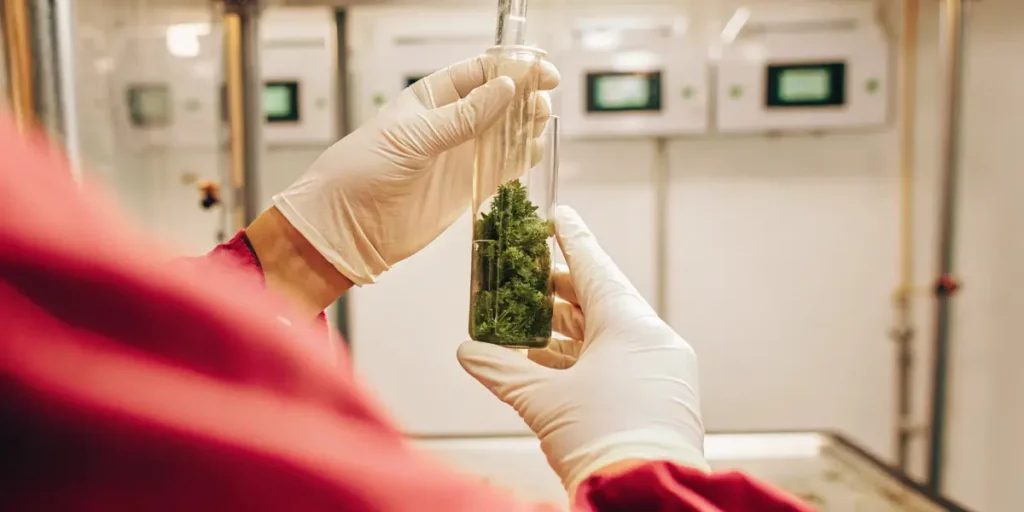
Environmental Benefits
Implementing sustainable practices can lead to significant environmental benefits. By reducing chemical usage, growers can protect local ecosystems and promote biodiversity. This is especially important in areas where cannabis cultivation is widespread.
When choosing strains for sustainable cultivation, consider those that are hardy and require less intervention. Girl Scout Cookies, for example, is known for its adaptability and can thrive in varying environmental conditions with minimal input.
Another environmental benefit of sustainable natural cannabinoid synthesis methods is the protection of soil health. By employing crop rotation and organic amendments, growers can maintain soil fertility and structure, preventing erosion and degradation. Healthy soil is crucial for robust plant growth and high cannabinoid production, making it a cornerstone of sustainable practices.
Moreover, sustainable practices contribute to cleaner water systems. By minimizing chemical runoff and optimizing water usage, growers can prevent pollution and conserve water resources. This approach not only benefits the local environment but also ensures compliance with increasingly stringent environmental regulations, safeguarding the future of the cannabis industry.
Challenges in Optimizing Natural Cannabinoid Synthesis
Despite the advancements, there are still challenges in optimizing natural cannabinoid synthesis. Factors such as environmental conditions, pest control, and genetic variability can all impact the production of cannabinoids.
Maintaining consistent quality across different batches can be difficult. Growers must carefully monitor and adjust their methods to ensure each plant reaches its full potential. This is where choosing reliable strains from Blimburn Seeds can make a difference.
One of the primary challenges in optimizing natural cannabinoid synthesis is dealing with unpredictable climate conditions. Weather fluctuations can affect plant growth and cannabinoid production, making it essential for growers to have adaptive strategies in place. Utilizing greenhouse environments and controlled climates can help mitigate these challenges, providing a more consistent growing environment.
Additionally, genetic variability poses a significant challenge. Each cannabis strain can respond differently to environmental conditions and cultivation techniques. This variability requires growers to have a deep knowing of each strain’s specific needs and adjust their practices accordingly. By doing so, they can optimize natural cannabinoid synthesis and achieve the desired quality and potency in their crops.
Overcoming Obstacles
One way to overcome these challenges is through research and experimentation. By knowing the specific needs of each strain, growers can tailor their approach to maximize cannabinoid production. For example, AK-47 may require different nutrient levels compared to GG4.
Another strategy is to use advanced technology, such as automated climate control systems. These systems can maintain optimal growing conditions, reducing the impact of external factors. This ensures a more consistent synthesis process.
Collaboration among researchers, growers, and scientists is crucial in overcoming the obstacles of natural cannabinoid synthesis. By sharing knowledge and resources, the community can develop innovative solutions to common challenges. This collaborative approach not only accelerates progress but also fosters a sense of unity within the industry.
Moreover, embracing continuous education and training programs can empower growers to stay updated with the latest advancements in natural cannabinoid synthesis techniques. By keeping abreast of emerging technologies and trends, they can refine their methods and achieve optimal results. This proactive mindset ensures they remain competitive in an ever-evolving industry.
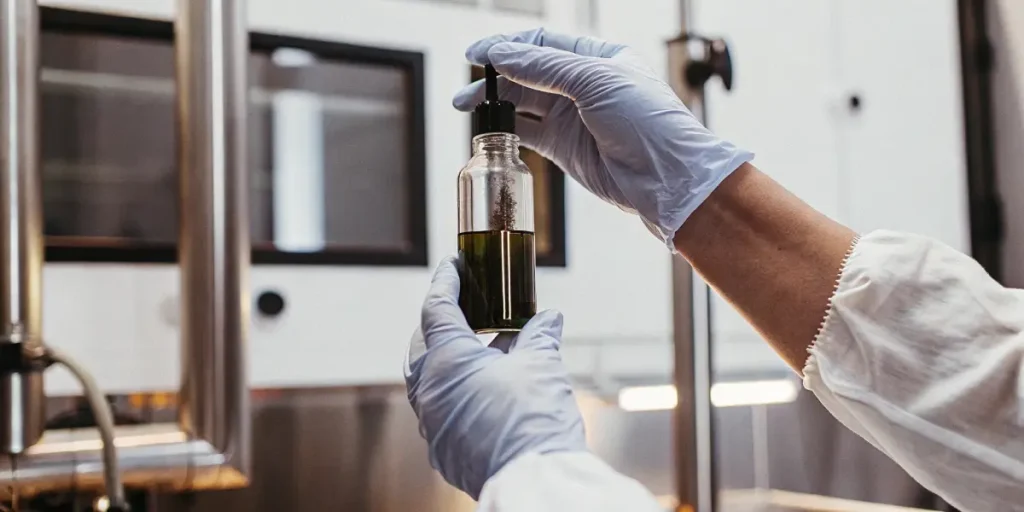
FAQs
What is natural cannabinoid synthesis?
Natural cannabinoid synthesis refers to the process by which cannabis plants produce cannabinoids, the active compounds responsible for the plant’s effects. This occurs primarily in the trichomes, which are small structures on the surface of the plant.
Cannabinoids are synthesized through a series of chemical reactions in the plant. Knowing these reactions can help growers optimize their cultivation methods and produce higher-quality cannabis.
The process of natural cannabinoid synthesis is a complex interplay of genetics, environmental conditions, and cultivation techniques. Each factor can influence the type and quantity of cannabinoids produced, making it essential for growers to have a comprehensive knowing of these elements. By mastering the art of synthesis, they can enhance the quality and effectiveness of their cannabis products.
Furthermore, natural cannabinoid synthesis is not limited to recreational or medicinal cannabis. It also plays a vital role in the hemp industry, where cannabinoids like CBD are extracted for various applications. This versatility highlights the importance of optimizing synthesis techniques to meet the diverse needs of the cannabis market.
How does laboratory synthesis differ from natural synthesis?
Laboratory synthesis involves replicating the natural processes of cannabinoid production in a controlled setting. This allows researchers to study cannabinoids without the need to grow the plant.
While natural synthesis occurs within the plant, laboratory synthesis uses chemical and biological techniques to produce cannabinoids. This approach can lead to the development of new strains and therapeutic applications.
Laboratory synthesis offers a level of precision and control that is challenging to achieve in natural settings. By manipulating variables such as temperature, pH, and substrate availability, researchers can explore various pathways of cannabinoid production. This controlled environment is instrumental in advancing our knowing of cannabinoid biosynthesis and its potential applications.
Additionally, laboratory synthesis provides an ethical and sustainable alternative to traditional cultivation. By reducing the need for large-scale cannabis farming, this approach minimizes land use and resource consumption. As the demand for cannabinoids continues to grow, laboratory synthesis presents a viable solution for meeting this demand while preserving natural resources.
Are there sustainable methods for cannabinoid synthesis?
Yes, sustainable methods focus on reducing environmental impact while maintaining high-quality production. These include organic farming practices, which use natural fertilizers and pest control.
Sustainable methods are important for protecting ecosystems and promoting biodiversity. By choosing resilient strains and minimizing resource use, growers can produce environmentally friendly cannabis.
Sustainable natural cannabinoid synthesis methods also encompass practices such as integrated pest management (IPM). This holistic approach combines biological, cultural, and mechanical techniques to manage pest populations, reducing the reliance on chemical pesticides. IPM not only protects the environment but also supports the health of the cannabis plants, resulting in higher-quality yields.
Moreover, sustainable practices involve a commitment to social responsibility. This includes ensuring fair labor practices and supporting local communities. By prioritizing sustainability, the cannabis industry can establish itself as a leader in ethical production, setting a standard for other agricultural sectors to follow.
What are some common challenges in cannabinoid synthesis?
Challenges include environmental conditions, pest control, and genetic variability. These factors can all affect the production of cannabinoids, making it difficult to maintain consistent quality.
Growers must carefully monitor and adjust their methods to overcome these obstacles. This involves knowing the specific needs of each strain and using advanced technology to control growing conditions.
Another challenge in natural cannabinoid synthesis is the regulatory landscape. As cannabis laws vary across regions, growers must navigate complex regulations to ensure compliance. This can involve additional paperwork and testing requirements, adding to the operational burden.
Additionally, market fluctuations can impact the demand and pricing of cannabis products. Growers must be adaptable, ready to shift their strategies in response to changing market conditions. This flexibility is essential for maintaining profitability and staying competitive in the cannabis industry.
Can advancements in synthesis techniques benefit growers?
Advancements in techniques can significantly benefit growers by improving efficiency and yield. New methods can lead to the development of more potent strains with unique benefits.
With access to advanced synthesis techniques, growers can enhance the quality of their crops and offer a wider range of products to consumers. This can lead to increased profitability and success in the market.
Advancements in synthesis techniques also facilitate the development of cannabis-derived products with specific therapeutic applications. By tailoring cannabinoid profiles to target specific conditions, growers can create products that meet the needs of medical patients more effectively. This specialization can open up new market segments and drive innovation in the cannabis industry.
Moreover, these advancements can lead to more sustainable practices by optimizing resource use and minimizing waste. As growers adopt new techniques, they can reduce their environmental impact while maximizing yields. This balance of sustainability and productivity is crucial for the long-term success of the cannabis industry.


